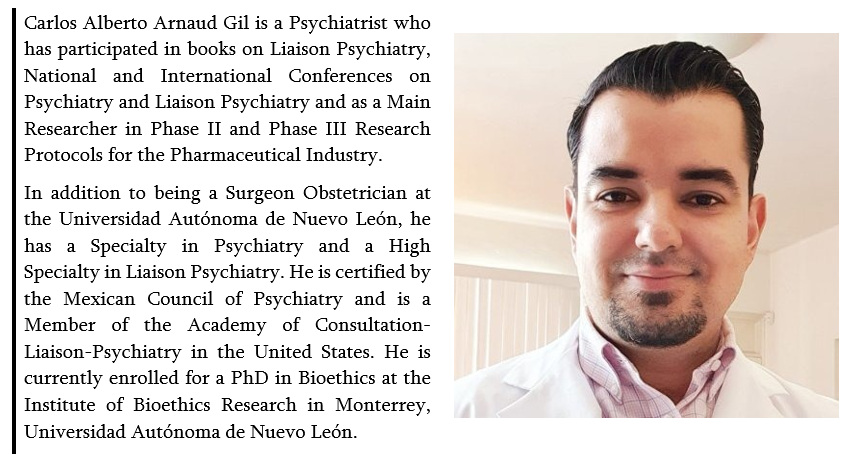At Q7 Consulting, we are aware that we live in uncertain times, and that Change management and leadership are now more than ever essential to the success of organizations.
The people we interview are from around the world and have exemplary career paths. All of them have achieved success within their roles, have essential leadership traits, are influential within their organizations, and have experience implementing and managing Change.
In this eighth episode of our new series, we interview Carlos Alberto Arnaud Gil, Psychiatrist, Professor, Lecturer and Coordinator of the Mexican Psychiatric Association in Nuevo León. He will give us a different perspective on Change management and leadership, which is not much talked about but is extremely important: mental health.

Below are the questions addressed in our interview with Carlos Alberto Arnaud Gil.
What have been your takeaways from managing Change in the scope of mental health?
Without mental health it is not possible to face Changes. When we refer to mental health, we refer to issues of well-being and good ways to deal with adversity. Mental health requires a degree of stability in different areas of life: work, personal, social. Currently, I think the issue of Change and mental health has a lot to do with the pandemic. Never in the recent history of human beings has there been such a need to be aware of the mental health of individuals and businesses.
The issue of mental health also involves illnesses that can lead to the process of Change. In the pandemic many people have experienced suffering from depression, anxiety, increased substance use, increased suicides, among others. The problem is not that these diseases occur, the problem is how they are dealt with or what we do about them. The real challenge of Change that this pandemic has presented us all is for people to seek out a mental health professional.
How did your formation support you to treat mental health regarding Change?
In my personal formation, it has had to do with values, with family and with spiritual aspects, which help to face the processes of Change. For example, if we lack empathy, we will not be able to develop good mental health.
How would you describe a person with good mental health to manage Change?
A person who can have a balance in life. That you can spend time with family, work and yourself. In this global work culture, it seems that people who have many work activities, who are always busy, are the most successful people, but they are not. In the long term, these people will be compromised in their mental health because there is no such balance.
What has been your role in supporting managers and entrepreneurs in taking care of their mental health?
I have several roles: Professor of psychiatry at Tecnológico de Monterrey, Coordinator of the Nuevo León Chapter for the Mexican Psychiatric Association, Psychiatrist and Lecturer. I feel that all these roles represent a social responsibility in times of the pandemic. The mental health of the population is so violated that I have felt the need to be an agent of Change. In each of my roles I try to make people aware of depression, work burnout, work bullying, abuse, self-care, and other mental health issues, that many organizations do not know how to properly address. The goal is for people to channel with the psychiatry area if someone has a mental health problem. My intention is also to educate managers and entrepreneurs, because if they do not provide well-being to their team they are positioned to fail.
I have participated in television and newspaper interviews so that people know that we can have good mental health if we do certain things. To prevent a mental health disease, you need good eating and exercise habits, be well with the family, have balance at work and in self-care. If there is already a lack of mental health seek care with a professional. As an agent of Change also I also seek to normalize the treatment of mental health and remove prejudices, this is a challenge that has had to be faced in the pandemic.
What strategies do you recommend to managers and entrepreneurs to communicate Changes in their organizations?
Human beings have been agents of Change because we evolve. This pandemic advanced the evolutionary speed of our species in organizational and business issues. It was a technological revolution: implementing working shifts and home office. However, it can be a matter of confusion and doubt for some people if managers and entrepreneurs do not know how to communicate the Changes efficiently.
The strategy is the use of effective, clear and accurate communication, which requires certain inter- and intrapersonal skills such as empathy, clarity, intelligence and speed of thought. These are skills that any manager or entrepreneur must have to be an agent of Change and lead their teams in this process.
In your experience, what are a person’s worst enemies when faced with Change?
There are certain personalities who expect others to adapt to them or for the conditions to adapt to them. But the pandemic has taught us that we have to adapt to circumstances. On the other hand, there are certain personalities who do not have as much resilience. Resilience is the ability to adapt to adverse situations.
Lack of empathy, clarity and emotional connection by another human being can be a condition by which the company or employees do not improve their evolutionary adaptive capabilities. We have to set limits, be clear and be human. We have to be compassionate, empathetic and kind; this is the only way we humans are going to get better after this pandemic.
What Changes does the world of psychiatry face today and what have you done to deal with them?
Psychiatry has been evolving in big steps for the past 20 years. The psychiatrist has never felt so medical, as psychiatry had gone to the side of psychology before. Today, neurosciences converged again: neurology, psychiatry, brain study and the treatment of brain diseases. The pandemic arrives at a time where all that information can be used for the benefit of the client. I use all that information that we as doctors have and transform it into simple words with evidence to apply it.
When you implement a Change, what are the strategies you recommend to avoid acting as before?
Through awareness of the benefits and positive aspects that have been achieved with Change. Many times the client tells me: “I now feel very good, I can now be the dad I want to be, the worker I want to be, I can enjoy my family”, but if we return to the same practices as before such as sleeping late, not exercising, stop taking medication, do not respect the balance, then the problem will return.
On the other hand, telemedicine came to stay. Before the pandemic I consulted 5% of my clients by video call, usually because they are out of town or are from other countries. I now consult 80% of my clients by video call. Many of my clients tell me that they feel very comfortable making consultations through video calls and that they feel the same benefit as if it were face-to-face. It’s these Change processes where if you’re checking benefits, we don’t have to go back to the previous practice. What you have to look for is positive evolution in every way.
In the wake of the COVID-19 pandemic, what are the main Changes you’ve noticed and your recommendations for dealing with them in a healthy way?
The main Changes I think have to do with the spiritual, social and personal part. Many clients tell me that the most relevant thing in their lives as a result of this pandemic is the value of life, health, family and freedom. I believe that this pandemic will be worth it if it has led us human beings to value the basic important things like life. Today we have to rethink what our thinking and philosophy of life was like, and this is a process of Change.
In general, what is your recommendation for people who manage Changes in their organizations, communities, or homes?
I ask my clients: what do you expect from this treatment? What are your expectations of consulting with me? Setting the goals and the plan to achieve them is my recommendation for people who manage any type of Change.
This pandemic has confronted us with the reality that we cannot live without mental health and cannot function without mental health. I am convinced that after this pandemic psychiatry, health and mental illness will be vindicated, because the pandemic has advanced us many years in matters of mental health, technology and education.
